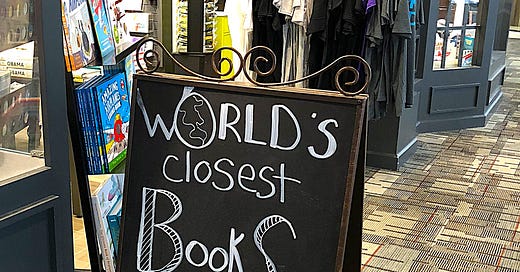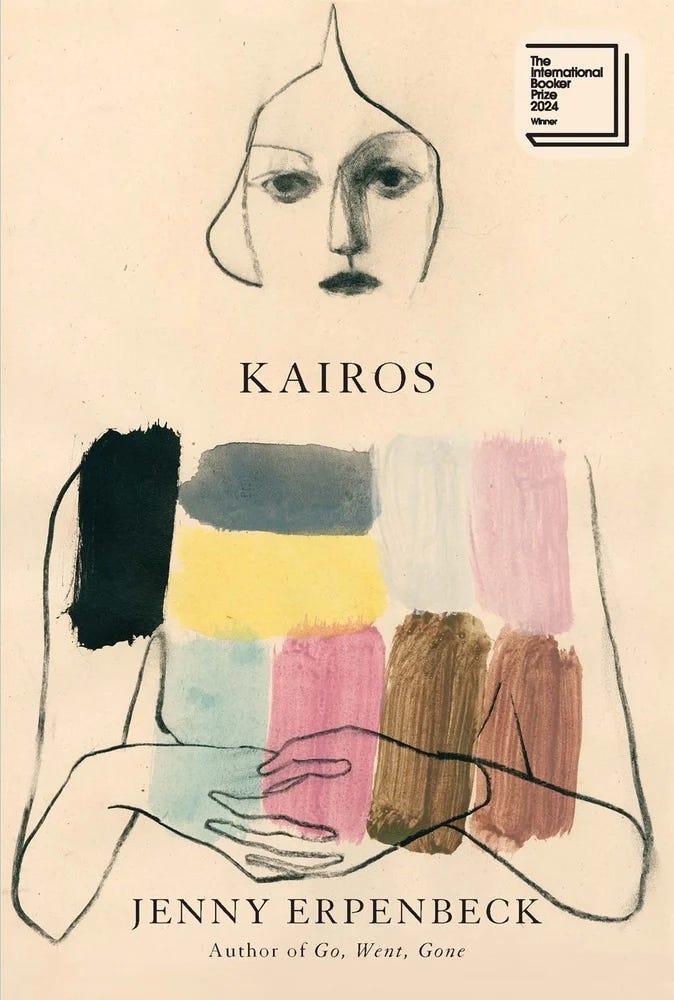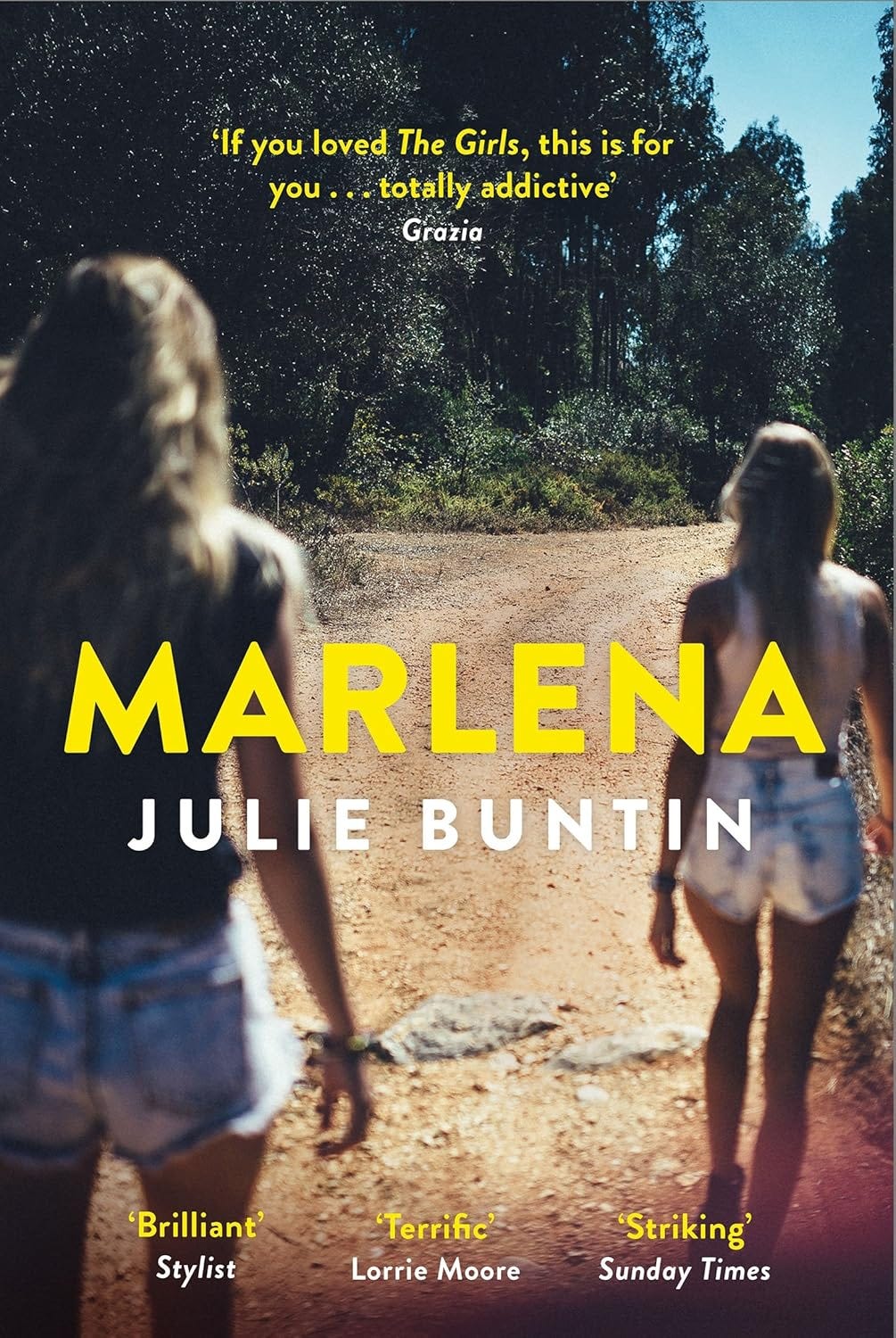Coffee apparatus aboard 7 a.m. flight from Ironwood, MI, to Minneapolis, MN, “on the fritz.”
Moments after landing, from a Starbucks in the outer reaches of Concourse C, I spot the above sign. I like the attitude—also the display of banned LGBTQ+ books in the right-hand window.1
Mentioning this because I walked out with Jenny Erpenbeck’s novel Kairos, winner of the 2024 International Booker: Older woman detailing her affair with a much-older writer when just beyond girlhood. Sublime writing, candor, poignancy, a view of daily life in both the latter days of East Germany and the early days of youthful passion. I’m only on page 75 but already want to fist-bump the Booker pickers.2
Anyway, went off-grid provisioned with four novels. Read three, plus three others—resulting in a three-three draw between curation and serendipity.3
As I said in an earlier post, print hunger can lead a guy to prowl a cabin’s shelves—as recently as summer before last, I unearthed Jetta Carleton’s, The Moonflower Vine (1962).4 Trouble is, save for fresh editions of dragonfly handbooks and the like, there’s been precious little replenishing. (And much as I esteem my long-deceased mother-in-law, I was not about the blow the dust off any of the seventeen Georgette Heyer novels in the back bedroom.)
OK, diving in:
The Good (fiction):
The Bee Sting, Paul Murray (2023)5
Downloaded to Kindle from Seattle Public—my go-to for books I don’t buy6, though I should’ve bought this one. Murray is Irish, author of Skippy Dies (2010) and others. I knew early on that The Bee Sting would be on my personal shortlist for the year.7 Since I hadn’t seen a paper copy, I was surprised how hefty it turned out to be (656 pp.). This page count allows for fleshed-out backstories, a spreading around of our attention, yet there’s a clear through line, a climax we accelerate toward centripetally.
The Los Angeles Times review ends this way:
The Bee Sting ought to cement Murray’s already high standing . . . [It’s] a triumph of realist fiction, a big, sprawling social novel in the vein of Jonathan Franzen’s Freedom. The agility with which Murray structures the narrative around the family at its heart is virtuosic and sure-footed, evidence of a writer at the height of his power deftly shifting perspectives, style and syntax to maximize emotional impact. Hilarious and sardonic, heartbreaking and beautiful—there’s just no other way to put it: The Bee Sting is a masterpiece.
Marlena, Julie Buntin (2017)8
Also downloaded from SPL. Can’t recall how I discovered this—maybe recommended by the library site, or maybe I saw it’s set in Northern Michigan (where Buntin was raised) . . . not to be confused with the Upper Peninsula (aka The Yoop) where I was reading it.
Anyway, I was wrong about this one. I took it, at first, to be a young woman’s coming-of-age story—of interest mainly to young women coming of age. But it’s really about the loss of a friend (we learn about the death almost at once—it haunts the text throughout), and about how a small, rather poor/rather isolated town does and does not determine the life occurring within it. The novel was smarter, more penetrating than I’d appreciated—I was won over, my misgivings washed away.
The Good (nonfiction):
XO [essay/memoir], Sara Rauch (2022).9
Sometimes, midnight-ish, under the covers, having decided I’m in no state to focus on my main book (yet still resisting sleep), I pick through the Kindle’s stacks for something different—in mood, genre, number of brain cells required. The next day, firing up the device again, I’ll start reading and go, Wha—?? The Anglo-Saxon Chronicle?10
As a character in Jamie Gordon’s The Lord of Misrule exclaims, Jesus put me wise.
Rauch was a student some years ago in the low-res MFA program where I taught (Pacific University). To be candid here, sometimes you read an ex-student’s book out of fondness for the student, out of writerly solidarity, etc., without expecting, quite, to be reading the work of a peer. Happily, for two books this year, that was not the case—Alissa Hattman’s short post-apocalyptic novel, Sift (2023),11 and XO.
When I popped it open (under the covers) it was a have-a-quick-look kind of deal—I’d actually read it last October. Instead (later that week, fully awake) I read it straight through again.
I do, sometimes, re-read my absolute favorite books—Suttree . . . So Long, See You Tomorrow . . . Beloved . . . The English Patient . . . Jesus’ Son . . . Old Mr. Flood. But I don’t re-read compulsively, or ritualistically (the way some read Jane Austen again and again). Once in a blue moon, I re-read a novel (a short one) right away—I finished Normal People (Sally Rooney, 2018) in one day, then turned back to the opening and started again. And I re-read Gone Girl (Gillian Flynn, 2012) after a few weeks to see how the hell she pulled it off.
Rauch’s memoir describes the arc of her sexual life, taking in an almost-marriage to a woman, a clandestine affair with a male mentor, and, later, marriage to her now-husband. It’s thoughtful, fluent, candid when it needs to be, discreet when discretion is called for. It’s a trustworthy book. By “trustworthy book” I mean one that makes me believe my time won’t be wasted—by overwriting, triteness, ideas that beg for more unfolding, self-indulgent side trips, mawkishness . . . it’s not that you disable your crap detector, but reading’s more fun when you stop expecting it to go off every two minutes.
10% Happier [memoir/nonfiction], Dan Harris (2014)12
My sister-in-law paperback. I ignored it for a week. Self-help? Inner shrug—I mean, I’m 76, you know? Still, I picked it up, got engrossed. Score one for serendipity.
It was the tenth anniversary edition—new prolog, and so on. Maybe you’re one of the several million who know this one, but I’d never run into it, nor did Harris’s name ring a bell at first. It is a self-help book, but it’s equally a memoir—the story of a man taking stock of his life mid-stream, and finding a tool for re-aiming its trajectory. These days we’re awash in “recovery” books—from booze/drugs, from abuse, religion, political oppression, horrific accident, school shooters, patriarchal fuckery, etc. When they work it’s because they give us more than the familiar arc—sick to well, trapped to free, inaction to action to achievement, benighted to belighted.
For twenty-one years, Harris was an ABC television newscaster. He was promoted from the minors at a young age, survived the cutthroat milieu, but acquired a drug habit and crashed, found a path out by way of meditation. He eventually became a Buddhist—he’s not shy about the label, though he’s a secular Jew, as are many of his instructors (formal and informal).13 He believes (as I do) that secular Buddhism is an exceedingly useful description of how the mind works.
I hope you’ll investigate this one—even if you’re allergic to the touchy-feely. Harris is fundamentally a journalist and dyed-in-the-wool skeptic, a good writer, a good companion on this road.
His current project is the podcast 10% Happier with Dan Harris (available on Spotify and elsewhere).
The Meh:
The Buried Giant, Kazuo Ishiguro (2015)14
Next week, I’ll post a slate of novels about couples in long-term marriages/partnerships. I asked my fellow members of Facebook’s Literary Fiction Readers group for ideas. They responded abundantly. I was a little surprised to see Ishiguro’s novel among them—it was the only work of his I’d never read (put off, maybe, by less-than-stellar notices when it came out). But ordinary readers seemed to be giving it a solid four stars, so it downloaded a copy.
Ishiguro is an inventive, off-the-beaten-path writer—and, I should point out, a Nobel Laureate (2017). Each of his projects is a fresh shot in the dark—no self-copying. The Remains of the Day (1989) is a great book. Never Let Me Go (2005) and When We Were Orphans (2000) and Klara and the Sun (2021) are each solid works and have multitudes of fans. I even read The Unconsoled (1998)—one of those WTF novels where nothing makes sense, until you surrender to its altered reality. Anyway, I thought it was time to give The Buried Giant a try. In dark-ages Britain, against a background of Brits vs. Saxons, an old couple sets out to visit the village where their son lives. Episodes ensue, stuff happens. But I kept waiting for . . . well, the payoff, a buried giant, something. I sped through the last third. Whatever the four-star readers (and some reviewers) found there, I missed utterly. I think no less of Ishiguro for this, I should add—one of my mantras: If you’re never thrown out at the plate, you’re not taking enough chances.
The Ugly:
Rain Girl, Gabi Kreslehner [trans. by Lee Chadeayne] (2010)
This is the first of two novels featuring Austrian homicide detective, Franza Oberwieser. I swear I have no idea how this wound up on my Kindle. Friends, this is a dreadful book. Why, you might well ask, did I soldier on to the end? Morbid curiosity? Maybe there was just enough noir-ness to tease me along (late at night, under the covers). Eventually, it succumbed to the pile-up of coincidences and trite/overheated sentences.
I read lots of books in translation—from good presses [Charco, Archipelago, Europa Editions, Open Letter, NYRB, & Other Stories, Graywolf, et al.]. These folks are justifiably proud of their translators (who routinely win prizes). Translators can have divergent philosophies, levels of expertise in the original’s language, and innate talent for producing artful English. It’s also true that translations need updating every generation or so (it bums me to think of young modern readers turned off by prissy/fusty/upper-crusty versions of, say, the great 19th C. French classics—often the free ebook editions from Amazon are these antiquated versions). All that said, I can’t think of a time when I felt I was reading a crappy translation of a recent novel. In short, it feels churlish to blame Lee Chadeayne . . . especially since I just read (in his 2017 obit) that “he was a charter member of the American Literary Translators Association, where he was he editor of the ALTA News, and was an active member of the American Translators Association since 1970, and past editor of their newsletter, The Chronicle.”
Where’er the blame belongs, here’s a brief taste of Rain Girl’s prose:
The impact was muffled, yet loud enough to resonate in his ears forever after. She had flown across the car and yards into the air—her body strangely weightless, like a rag doll. (p. 2)
That’s just the way it was. Like pieces of a puzzle slowly coming together, creating a picture. (p. 21)
As always, when Franza was confronted with confusing homicides—the kind that gripped her mind and swept over her, lodging in every fiber of her being—she found herself longing for childhood: the cool meadows, the little brook . . . (p. 24)
. . . and she felt her heart beating like a drum. (p. 94)
When he returned he was accompanied by a Marilyn Monroe-like buxom blonde. She was easy on the eyes in her tight skirt and fitted blouse, which showed off her curves. (p. 201)
He lost control as she chased him from climax to climax, like a tiger chasing its prey. (p. 206)
Note for new subscribers/followers:
Thanks for signing on! I promise not to waste your time.
I mean this Substack to be a continuing resource—earlier posts in several sub-categories are indexed and reachable from buttons atop the Home Page.
I welcome comments.
I also welcome new recruits for the Birth Year Project. Here’s the poop on that:
Birth Year Project:
You supply your birth year, I respond with a short list of books published that year—the popular/well-known titles first, then some books I'd recommend. If your year's already been done, I'll do an update. So far, we’ve done 17 years altogether, between 1944 and 1989. [See BYP Index in navigation bar.]
Extra credit: You read one of the books (ideally one you're unfamiliar with), then tell me what you thought. If we get enough of these, I'll aggregate and post.
And:
This Substack is best viewed on a laptop or tablet, or by navigating to the site (the version in your email isn’t formatted correctly).
Closest Bookstore: Words: https://www.mspairport.com/airport/eat-shop-relax/words
Kairos:
https://bookshop.org/p/books/kairos/18956296?ean=9780811238533
The unread one: The Employees: A Workplace Novel of the 22nd Century, Olga Ravn [trans. by Martin Aitkin] (2022). Ravn is Danish; this is her first work available in English. Here’s a piece on her from The Guardian:
https://www.theguardian.com/books/2023/sep/09/olga-ravn-learning-how-to-love-a-child-isnt-something-that-happens-in-a-second-my-work-novel
I wasn’t in the right (as they say) head space for this, but I’ll definitely get it again.
Moonflower: One of the four-sister novels I posted about last June:
Bee Sting:
https://bookshop.org/p/books/the-bee-sting-paul-murray/18789047?ean=9780374600303
https://bookmarks.reviews/reviews/the-bee-sting
Library ebooks: There’s a sweet spot: new enough to have an ebook, not so widely known that there are 305 holds on 6 copies. Why The Bee Sting wasn’t one of the latter is a mystery.
Knowing early on: I once got into a tug-of-war in the pages of Poets & Writers Magazine with a fellow writer who’d upbraided me over remarks I made about being a contest judge, my advice for entrants. I read the first page, I’d said. If there’s anything there I read another. This wasn’t precisely true—I was trying to make a point.
That tussle aside, don’t we often—even usually—know how good a piece is from the git-go? True, the stories within some books take time to gather speed, and sometimes it takes us a while to sync with a book’s wavelength. But, most often, what I call the mind of the story reveals itself on the opening page. The voice, the rhythm, the implicit choice of what to say and what not to say . . . you hear it, you react, you sense it hitting you right (or making you reserve judgment), you start getting a feel for how smart it is. It’s all about someone talking to you—a narrator or a writer’s mind through the art of narration.
Rauch: Issued by Autofocus Literary:
“A publisher of artful autobiographical writing in any form: personal essay, memoir, confessional poetry, journals & diaries, letters & e-mails, bits & pieces of each of these, or some other thing that makes art from your life. We publish a book imprint, an online journal, and a podcast.”
https://www.autofocuslit.com/
I first mentioned XO in Small Press Report [1]:
Anglo-Saxon Chronicle: Collection of annals chronicling the history of Anglo-Saxon Britain, including accounts from the earliest English historians, Bede and others, updated through about the 1150s.
Think of me what you will, I’ve actually read the whole blessed thing.
Sift:
https://the3rdthing.press/product/sift/
https://independentbookreview.com/2023/11/01/book-review-sift/
Harris:
https://www.instagram.com/danharris/?hl=en
https://www.danharris.com/
https://en.wikipedia.org/wiki/Dan_Harris_(journalist)
Instructors: Notably Mark Epstein and Joseph Goldstein. Epstein is as Harvard-trained psychiatrist who has long used Buddhist insight in his practice. I was happy he turned up in Harris’s account (they often meet for talks over lunch)—Epstein’s books have helped me as well: Thoughts Without a Thinker (1995), Going To Pieces Without Falling Apart (1999), Going on Being (2009), and several newer ones. Here’s his website:
http://markepsteinmd.com/
[Actually crossed paths with him once in Seattle when he read at Elliott Bay Books.]
And Goldstein is a widely known practitioner of Vipassana (or insight) meditation, author of Mindfulness: A Practical Guide to Awakening (2016) among a slew of others.
Ishiguro:
https://www.theguardian.com/books/2015/feb/27/critical-eye-book-reviews-roundup-buried-giant-ishiguro
And from The Guardian, writers picking their favorite Ishiguro novels:
https://www.theguardian.com/books/2021/feb/20/my-favourite-kazuo-ishiguro-margaret-atwood-ian-rankin-sarah-perry









Welcome back! I read The Bee Sting this summer too, and the ending had me holding my breath. Kairos is on my TBR.
I think Remains of the Day is a masterpiece, but The Buried Giant was a slog! Yikes.